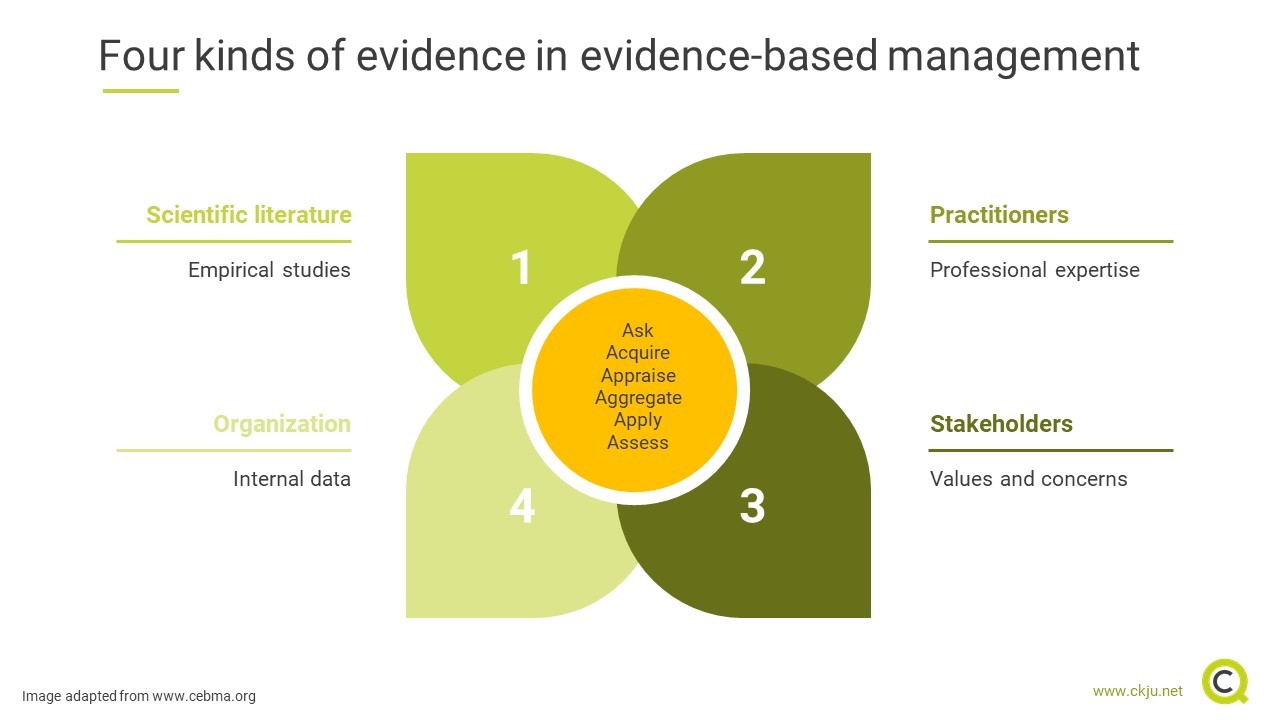- Blog
- EBM and organizational performance
Contents
- As a manager and professional, decision-making is daily business
- The 'Evidence Movement' targets at increasing decision-making quality in medicine, law enforcement and management
- Why do we need EBM in business? There are more than 200 different biases that affect decision-making quality
- A considerable amount of information we are exposed to is of questionable quality
- Stress and cognitive overload undermines decision-making quality
- Evidence-based Management is an approach that helps to increase decision making quality
- How does Evidence-based Management work? It encourages us to use a structured decision-making process
- Evidence-based Management has critical thinking in its heart and points towards four types of evidence
- Evidence-based Management puts strong emphasis on contextual and situational factors
- Evidence-based Management encourages to think twice before starting an intervention
- There are resources available provide guidance on how to use evidence-based Management effectively
- References and further reading
As a manager and professional, decision-making is daily business
Particularly for managers and professionals, decision-making is daily business. Day in and day out they are confronted with various types of decisions ranging from small ones, such as when to schedule meetings, to strategic ones, such as when to launch a new product into the market. There is an unspoken consensus and convictions that most, if not all the time, the intuition-based decision-making approach leads to high-quality outcomes. This makes them proud of their decision-making skills and also meets the implicit expectation of their followers, team memebers and coworkers, which require them to be competent and decisive (Hogan und Kaiser 2005).
When somebody asks managers or professionals why they think their decisions are the right ones, more often than not they relate to year-long experience, education and the knowledge accumulated during professional life. But this is not all. In addition, you will hear the argument that knowledge is kept up-to-date by reading business books and CEO biographies on how to solve tricky business problems and become a successful manager. On top of this, many of them participate in internal and external training programs led by consultants and gurus, who promise to teach how to develop the organization to the next level by following the most recent management trends and models. Isn’t that more than enough to show that managers and professionals make the right decisions?
The 'Evidence Movement' targets at increasing decision-making quality in medicine, law enforcement and management
These questions were the starting point of the so called 'Evidence Movement', which has its origin in the healthcare sector and since then has reached many other areas, notably also including management (Baba und HakemZadeh 2012). The driving force behind evidence-based practices is the increasing awareness that human decision-making is prone to bias and failure, which in turn leads to poor outcomes. This is especially true in high-risk areas such as the healthcare sector, where poor decisions can be a matter of life and death. However, it is not just healthcare where poor decisions and as a result human error can have a catastrophic impact (Strauch 2016). Day in and day out, managers and professionals and other stakeholders make decisions that shape the future of our organizations. Evidence-based Management (EBM) targets at helping us to improve decision-making quality.
Why do we need EBM in business? There are more than 200 different biases that affect decision-making quality
Looking at recent insights from research and science unveils that the traditional and intuition-based decision-making approach mentioned above leads to poor outcomes. One of the key factors that undermines our decision-making performance is bias. In one of the first attempts to structure the more than 200 biases that describe how we are influenced by others, context and ourselves, Spetzler (2016) identified six different bias categories:
- Social influences
- Protection of mindset
- Personality and habits
- Faulty reasoning
- Automatic associations
- Relative thinking
As a practitioner, of course it is not required to know all those biases in detail. However, it definitely would help to be aware that decision-making behavior is not as rational and straightforward as we might think. It would be even more beneficial to know that there are different bias categories that describe how we unconsciously tweak our decision-making behaviour in the one or other (undesirable) direction.
Management skills newsletter
Join our monthly newsletter to receive management tips, tricks and insights directly into your inbox!
A considerable amount of information we are exposed to is of questionable quality
Another factor that impacts decision-making quality is the information or evidence utilized to make decisions. Most of us tend to believe that the information we are exposed to throughout the day is valid and “true”. Scrutinizing the business books, newspaper articles, social media posts and consultancy white papers etc. in more detail reveals that most of them don’t live up to basic quality standards as for instance are used in scientific research. Beyond that, most business professionals don’t read scientific journals (Rynes et al. 2002) because they are hard to read and many of them are still hidden behind paywalls.
When we cannot solely rely on the popular business literature, why not use the internet to search for relevant information? While there is a huge amount of relevant content created every day, it strongly depends on where you look for it and who wrote it for whom. Many articles, blog posts and website target at selling the most recent management trends they think are required to increase organizational performance (and make money out of it). This is why it is always good advice to question when easy answers are given in response to complex problems. Critical thinking is one of the key skills needed to cope with the increasing amount of information available.
Stress and cognitive overload undermines decision-making quality
Finally, there are factors like stress and cognitive overload that impact the way decisions are made on all levels. Those factors weigh heavily on decision-making quality when times get tough and when the pressure to deliver results increases. For instance, stress and a lack of sleep is a combination that many business professionals face on a regular basis, that has a significantly negative impact on ability to make high-quality decisions (Larsen 2009). This effect is reinforced when the situation involves a high-level of decision complexity, which draws on cognitive resources (Dobbins und Han 2009).
Evidence-based Management is an approach that helps to increase decision making quality
Evidence-based Management doesn’t provide answers to specific business problems. This also makes Evidence-based Management different to many of the management trends and fads that promise to solve business problems by following recipes like pre-determined models or organizational interventions. Instead, Evidence-based Management is an approach that helps us to reflect on how we make decisions and gives guidance on how to improve our decision-making quality.
How does Evidence-based Management work? It encourages us to use a structured decision-making process
Everything starts with an understanding of the specific situation (or business challenge) and what has to be achieved with your particular management intervention. While this might sound obvious, there are many cases where expectations, contextual factors and formal objectives are not taken into consideration. As a consequence, the decision quality is poor by design. By reminding us to briefly stop and ask what has to be decided (business problem/issue), who is involved, and what the desired outcome is, Evidence-based Management helps us to fully grasp the decision situation even under stress and to evaluate different sources of evidence critically before making a decision.
Evidence-based Management has critical thinking in its heart and points towards four types of evidence
The traditional intuition-based decision-making approach strongly relies on experience. Evidence-based Management makes us aware that experience or professional expertise is just one of four possible sources of evidence that should be considered for decision-making. Besides our professional expertise, Evidence-based Management points to organizational data, scientific literature and stakeholder values and concerns as additional sources of evidence (refer to above picture).
Depending on your time restrictions and the decision magnitute, do a comprehensive review of all four sources of evidence or just a brief mental “walk-through” in case you are already aware of them (e.g. from former decision processes). After you acquired the evidence, critically appraise it and aggregate the key take-aways in a way such that you can apply them in your specific business setting. Finally, assess the outcome and align your intervention strategy accordingly.
Evidence-based Management puts strong emphasis on contextual and situational factors
Evidence-based Management combines qualitative and quantitative evidence, which makes it very attractive for complex business settings. There is for instance a strong body of quantitative evidence available on the effect of goal agreements on performance. This makes it easy to conclude that goal setting theory (the theoretical foundation behind goal agreements) has a positive impact on performance. However, in order to better understand the “how” and “why”, Evidence-based Management encourages us to also take a look at qualitative studies that look beyond whether goal setting works or not.
Having stakeholders and experts considered as source of evidence also increases the contextual embeddedness of the decision-making process. In particular strategic decisions are usually complex by nature. Taking a holistic approach as suggested by Evidence-based Management is the very basis to coping with a high level of complexity in a VUCA world.
Evidence-based Management encourages to think twice before starting an intervention
‘Getting things done’ is one of the overarching themes that guides the way managers and professionals act in organizations. This focus on delivering results usually come along with an incline towards action. This action-orientation is reinforced by the unspoken expectation that hard work is the only way to make an organization succeed. While it has not to be a bad thing to be action-oriented, it could be when the actions taken are not aligned with the way organizations operate.
However, many managers and professionals tend to overact in times of change, crisis and stress. Evidence-based Management is rooted in social sciences and thus relies on the most recent insights into how organizations operate. And more often than not, there is no need for interventions on a micro-level, but for an integrated and holistic approach on how to help people to deliver high performance.
There are resources available provide guidance on how to use evidence-based Management effectively
Evidence-based Management is part of a broader movement that targets at increasing decision-making quality in organizations crucial for our society. There are resources around the web that can help you on the way to becoming an Evidence-based Professional. The Center for Evidence-based Management, also called CEBMa, is the leading authority in the area of evidence-based Management and leadership.
CQ Net - Management skills for everyone! is a learning platform that uses Evidence-based Management as an approach for all learning content provided. CQ Net offers a comprehensive online management resource library, as well as online management trainings, masterclasses and counseling. CQ stands for the Collaboration Quotient, which is reflective of how online trainings take place: they are agile, collaborative and make use of the combined knowledge of all participants to yield outcomes applicable in the real world.
Beyond that, CQ Net provides a breadth of articles and blog posts with updates and food for thought on the latest issues in management and organizational development. This is done while keeping in mind that management fads and trends do not constitute high-quality knowledge - it is the goal of CQ Net to make high-quality management knowledge affordable and available for everyone.
ScienceForWork is a webblog that publishes evidence-summaries in the area of human resource management and leadership. It is a great place to look for key take-aways from research findings that really make a difference in daily management practice.
You want to read more about Evidence-based Management and how it adds value to professionals and managers? Read the interviews we did with Eric Barends who is the Managing Director of the Center for Evidence-based Management (CEBMa):
References and further reading
Baba, Vishwanath V.; HakemZadeh, Farimah (2012): Toward a theory of evidence based decision making. In: Management Decision 50 (5), S. 832–867. DOI: 10.1108/00251741211227546.
Dobbins, Ian G.; Han, Sanghoon (2009): Rules Versus Evidence in Memory and Non-Memory Decision-Making. In: Military psychology : the official journal of the Division of Military Psychology, American Psychological Association 21 (1), S. 113–122. DOI: 10.1080/08995600802554755.
Hogan, Robert; Kaiser, Robert B. (2005): What we know about leadership. In: Review of General Psychology 9 (2), S. 169–180. DOI: 10.1037/1089-2680.9.2.169.
Larsen, Rolf P. (2009): Decision Making by Military Students Under Severe Stress. In: Military Psychology 13 (2), S. 89–98. DOI: 10.1207/S15327876MP1302_02.
Luhmann, Niklas (2000): Organisation und Entscheidung. Wiesbaden: Westdeutscher Verlag.
Rynes, Sara L.; Colbert, Amy E.; Brown, Kenneth G. (2002): HR Professionals' beliefs about effective human resource practices. Correspondence between research and practice. In: Hum. Resour. Manage. 41 (2), S. 149–174. DOI: 10.1002/hrm.10029.
Spetzler, Carl S. (2016): Decision quality. Value creation from better business decisions. Hoboken, New Jersey: John Wiley & Sons Inc.
Strauch, Barry (2016): Decision Errors and Accidents. In: Journal of Cognitive Engineering and Decision Making 10 (3), S. 281–290. DOI: 10.1177/1555343416654629.
Top Rated
About the Author

Comments
Most Read Articles
Blog Categories
RELATED SERVICES










Add comment